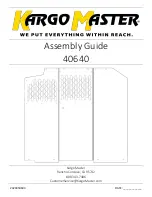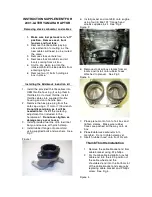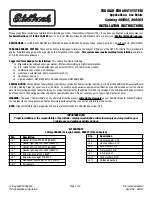
stopping and backing up in a traffic-free
location.
R
Before driving, check:
-
Trailer tow hitch
-
Safety switch for braked trailers
-
Safety chains
-
Electrical connections
-
Lights
-
the wheels
R
Adjust the exterior mirrors to provide an
unobstructed view of the rear section of the
trailer.
R
If the trailer features electronically
controlled brakes, pull away the vehicle/
trailer combination carefully, manually
brake using the brake controller, and check
the brakes for correct function.
R
Secure any objects on the trailer to prevent
the cargo from slipping when the vehicle is
in motion.
R
If you couple up a trailer, regularly check
the cargo for secure fastening and make
sure that the trailer lamps and (if
applicable) the trailer brakes are
functioning correctly.
R
Bear in mind that the handling will be less
stable when towing a trailer than when
driving without one. Avoid sudden steering
movements.
R
The vehicle/trailer combination is heavier,
accelerates more slowly, has a decreased
gradient climbing capability and a longer
braking distance.
It is more susceptible to side winds and
requires more careful steering.
R
If possible, avoid abrupt braking. Depress
the brake pedal moderately at first, so that
the trailer can activate its own brakes. Then
increase the pressure on the brake pedal.
R
If the automatic transmission continues to
shift back and forth between two gears
when driving up or downhill, restrict the
shift range. Select shift range
4, 3, 2, or 1.
A lower gear and lower speed reduce the
risk of engine failure.
R
When driving downhill, shift to a lower gear
to utilize the engine's braking effect.
Avoid continuous brake application as this
may overheat the vehicle brakes and, if
installed, the trailer brakes.
R
If the coolant temperature increases
dramatically while the air-conditioning
system is switched on, switch off the air-
conditioning system.
Coolant heat can additionally be dissipated
by opening the windows and by setting the
blower fan and the interior temperature to
maximum.
R
When overtaking, pay particular attention
to the extended length of your vehicle/
trailer combination.
Due to the length of your vehicle/trailer
combination, you will have to travel an
additional distance beyond the vehicle you
are overtaking before returning to the
previous lane.
Decoupling a trailer
G
WARNING
Vehicles with level control:
The vehicle is lowered as soon as you
disconnect the trailer cable. This could result
in your limbs or those of other people that are
between the vehicle body and tires or
underneath the vehicle being trapped. There
is a risk of injury.
Make sure that nobody is in the immediate
vicinity of the wheel housings or under the
vehicle when you disconnect the trailer cable.
!
Do not disconnect a trailer with an
engaged overrun brake. Otherwise, your
vehicle could be damaged by the
rebounding of the overrun brake.
X
Make sure that the automatic transmission
is set to position
P.
X
Apply the vehicle's electric parking brake.
X
Start the engine.
260
Towing a trailer
Driving and parking
Summary of Contents for 2013 GL X166
Page 1: ...GL Operator s Manual Nur f r internen Gebrauch For internal use only...
Page 4: ......
Page 32: ...30...
Page 80: ...78...
Page 158: ...156...
Page 331: ...Useful information 330 Stowage areas 330 Features 338 329 Stowage and features...
Page 360: ...358...
Page 376: ...374...
Page 432: ...430...
Page 446: ...444...
















































